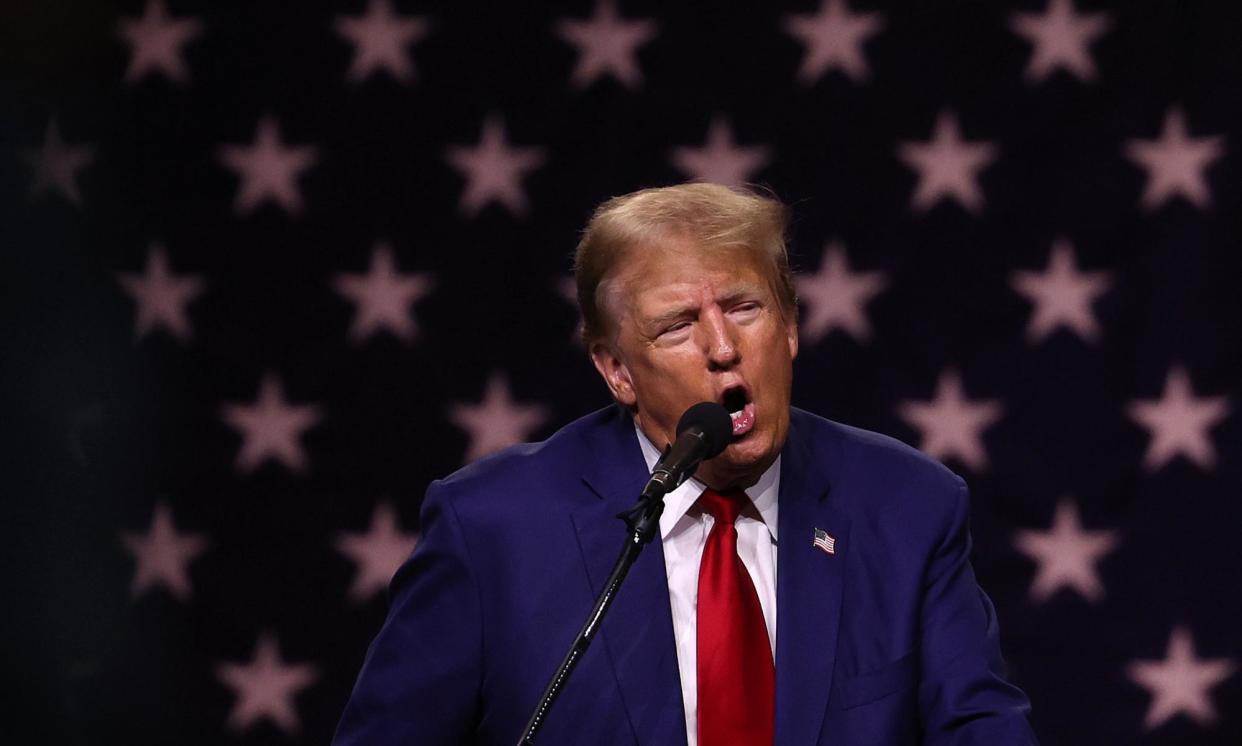Trump seeks to dismiss Georgia election case by claiming political speech

- Oops!Something went wrong.Please try again later.
Donald Trump’s lawyer asked a judge on Monday to throw out the Georgia criminal case over his efforts to overturn the 2020 election results in the state, contending the indictment violated the former president’s first amendment rights by charging him for so-called core political speech.
The motion to dismiss the election interference case brought by the Fulton county district attorney, Fani Willis, was similar in scope and theory to Trump’s request to throw out the federal indictment in Washington DC that was rejected this month.
Related: Suit yourself: Trump offers scraps of his indictment outfit for $4,699.53 a pop
Trump’s filing, submitted after a court hearing on the issue, directly attacked the charges that he and his allies violated Georgia’s racketeering statute in trying to reverse his 2020 election defeat, including his 2 January 2021 call pressuring the Georgia secretary of state to “find” 11,780 votes.
The 19-page motion sought to reframe the indictment as an attempt to criminalize Trump’s political speech, arguing that the former president’s repeated lies that widespread fraud corrupted the vote count were supposedly aimed at prompting investigations by state legislatures.
“It was directed at the bodies responsible for conducting government business, the bodies with the information in their possession, the bodies undertaking the investigations, and the bodies vested with the authority of adjudicating such complaints,” Trump’s lawyer Steve Sadow wrote.
The motion also argued that Trump’s claims of election fraud were protected by the constitution’s first amendment because the US supreme court had previously decided the government could not criminalize speech on disputed political issues just because it determined the views to be false.
“The first amendment prohibits the state from weaponizing its powers to silence disfavored viewpoints or prevent people from advocating such viewpoints to government officials,” Sadow wrote.
Trump probably faces a steep uphill battle to have the case dismissed, especially after the US district judge Tanya Chutkan in Washington DC earlier denied Trump’s near-identical motion to dismiss with a detailed 48-page opinion that cut down the same first amendment claims.
Chutkan wrote in her decision even if Trump was right that his statements disputing the outcome of the 2020 election were true, “core political speech” did not immunize him from prosecution if it was used in furtherance of criminal activity.
The decision also found that it was misguided for Trump to rely on the supreme court precedent in United States v Alvarez – that the Stolen Valor Act, which prohibits an individual from falsely claiming they received a medal for serving in the military, violated the first amendment.
The stolen valor case was not helpful to Trump, Chutkan suggested, because the supreme court did not undermine settled precedent allowing prosecutors to charge cases where speech was used to advance a crime.
Trump and the original 18 co-defendants in August pleaded not guilty to the racketeering charges. In the weeks that followed, the former Trump lawyers Sidney Powell, Jenna Ellis and Kenneth Chesebro, as well as the local GOP operative Scott Hall, took plea deals and became witnesses cooperating with the prosecution.
The Fulton county district attorney’s office does not intend to offer plea deals to Trump and at least two of his top allies, including his ex-White House chief of staff Mark Meadows and his former lawyer Rudy Giuliani, the Guardian reported last month.

